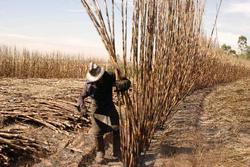
Reuters | Tuesday April 19, 2011
• Foreigners unnerved by Brazil land purchase limits
• Law change could hamper expansion of Brazil food output
• Slower expansion could fuel global food price rises
By Inae Riveras
SAO PAULO, April 18 (Reuters) - International investors have suspended at least $15 billion in Brazilian farming and forestry projects since August, when the government put limits on land buying by foreigners, sector analysts said on Monday.
Brazil is one of the world's largest producers of food and biofuels and the expansion of its output over the coming years is seen as crucial toward addressing growing demand for its products, especially from emerging economies such as China.
But the reinterpretation last August of a land law now limits purchases of rural land by foreigners to areas no larger than 250-5,000 hectares (620-13,350 acres) depending on the region and is proving a handicap for expansion, analysts say.
"Creating constraints for foreigners to buy land implies a reduction of Brazil's agricultural expansion for years to come," said Andre Pessoa, director of Agroconsult and the co-author of the study.
The reinterpretation of the law followed growing concern in the government over a "land grab" by foreigners, especially Chinese investors.
The ruling has scared off many international investors especially in forestry and in sugar and ethanol, sectors that had drawn a flurry of international investments in recent years.
The government has shown signs it may be willing to soften the law. Agriculture minister Wagner Rossi told Reuters he was advocating changes that would enable productive investments to keep coming, while barring the speculative.
The study released on Monday showed Brazil's agriculture will need 93.5 billion reais ($58.8 billion) in investments over the next 10 years to grow at a pace that would at least not aggravate the global imbalance between demand and supply that has persisted since the mid-2000s and boosted prices.
"At least half of this value would come from overseas," Pessoa said. The sum includes investments in land acquisition and the construction of infrastructure in farms.
The cane sector was found to be most hungry for investments, with an estimated 43.8 billion reais required, followed by the grains and cotton sectors with 31.2 billion reais and the forestry sector, with 18.5 billion reais needed.
Foreign companies are an important player in Brazil's huge agriculture sector. Trading houses, banks and inputs manufacturers, many foreign, provide financing for about 60 percent of the soy Brazil grows.
The study also suggested credit costs for growers were rising as a direct result of the law change.
It said foreign banks tended no longer to accept land in Brazil as collateral for loans since they are unable to take possession of it in case of a default.
"Brazil's interest rates are among the world's highest and investments in agriculture are usually long-term. Only foreign capital accepts these low returns," Pessoa said. (Editing by Dale Hudson)












